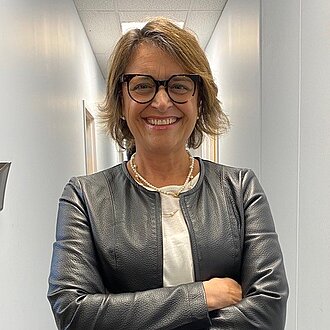Prof. Monica Fedeli

Prof. Monica Fedeli Ph.D. is Professor in Teaching and Learning Methods and Organizational Development at University of Padova. Since 2021 she is Vice Rector for the Third Mission and relations with the Territory.
She has been Adjunct Professor at Boston University, at Michigan State University, at Julius Maximilian University of Wurzburg, Germany, and Visiting Professor at California University Berkeley, School of Education. In 2020 she was Fulbright recipient at University of Georgia in US where she spent 7 months.
- active teaching
- participatory teaching and learning
- faculty development
- university business dialogue
- women leadership
- personal and professional development
- educational coaching and
- Third mission and continuing education
She published more than 150 articles, books, and book chapters in variety of national and international journals, and book series.
CG5: Higher/Adult Edcuation for sustainable development: policies and practices
Co-Moderator: Dr. Concetta Tino, Dr. Joellen Coryell
Higher education has seen as the guide for the modernization of societies (Rungfamai 2019). In fact, today University is not only an educational institution or the centre of knowledge creating (research) but recently the so-called third mission (engagement) is part of its main activities. With this wide expansion of university role
higher education has acquired a larger potential for contributing to societal development. Through these three tasks university has the possibility to generate effects on all individuals and systems of society: on those that are taking part of formal or continuing learning paths (educational role); on the policy and educational systems (research); on the whole communities (engagement). For the general and the potentiality of the effect that it can generate on the societies the university has also the responsibility to act as one of the main agents for guaranteeing an education for sustainability (EfS).
Parallelly to university also adult education organizations can play an important role to develop individuals’ mindset for sustainability. An organization that embodies education for sustainability must take on a whole-institution approach (WIA), looking into various dimensions of the institution such as pedagogy and learning, curriculum, community-connections, capacity-building, institutional practices, and vision, ethos, leadership and coordination (Mathie & Wals, 2022).
After the CGW the participants will be able to know what can be done within an organization to contribute to the development of individuals’ mindset for sustainability.
According to WIA approach, they will explore the state of art of regulations and practices adopted by universities/ adult organizations institutions to achieve the goals of Agenda 2030 and learn how to compare policy and practices for sustainability.
- Fedeli, M., Liotino, M., Taylor, E.W., Araneta, M.G. (2022). Enhancing Learning in Higher Education Using MOOC: The Experience of the University of Padua. In: G. Casalino, M. Cimitile, P. Ducange, N. Padilla Zea, R. Pecori, P. Picerno, & P. Raviolo (Eds.) Higher Education Learning Methodologies and Technologies Online. HELMeTO 2021. Communications in Computer and Information Science, vol 1542. Springer, Cham. https://doi.org/10.1007/978-3-030-96060-5_16
- Tino, C. & Fedeli M. (2022). Career planning, proactivity, self-employability, and labour market: undergraduates’ perceptions. Form@re (1) pp.262-278.
- Tino, C., Lavagnolo, C., Fedeli, M., Bierema, L., L. (2022). Women’s career decision making and interest in engineering: a qualitative analysis of influential personal and contextual factors. Andragoška Spoznanja, 1-22.
- Fedeli, M. & Bierema, L. L. (Eds.). (2019). Connecting adult learning and knowledge management. Strategies for learning and change in higher education and organizations. Svizzera: Springer International Publishing.


